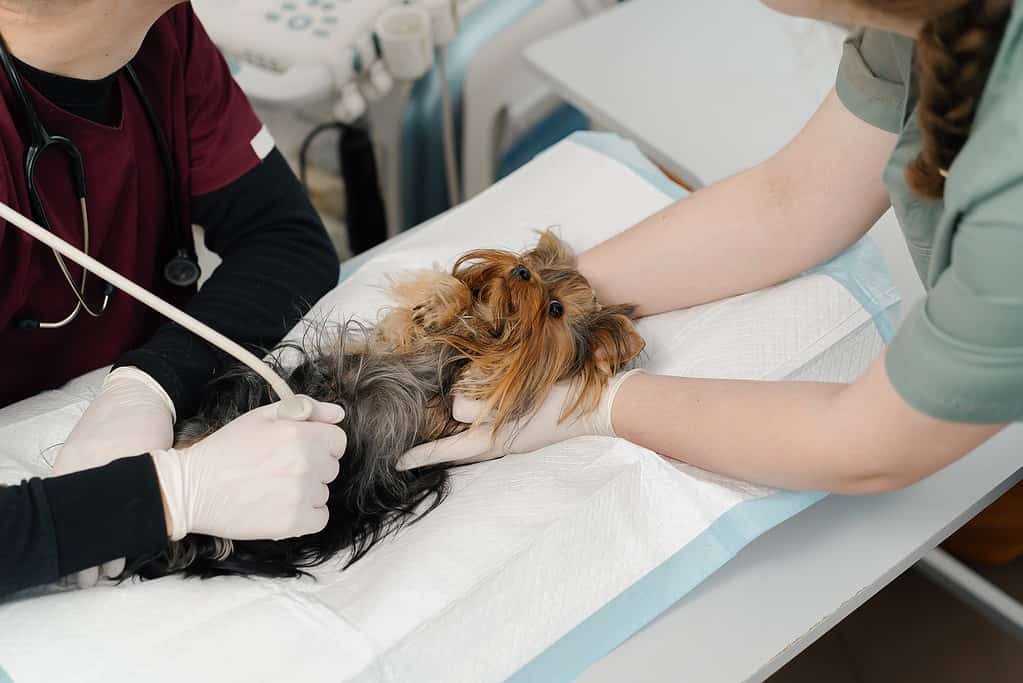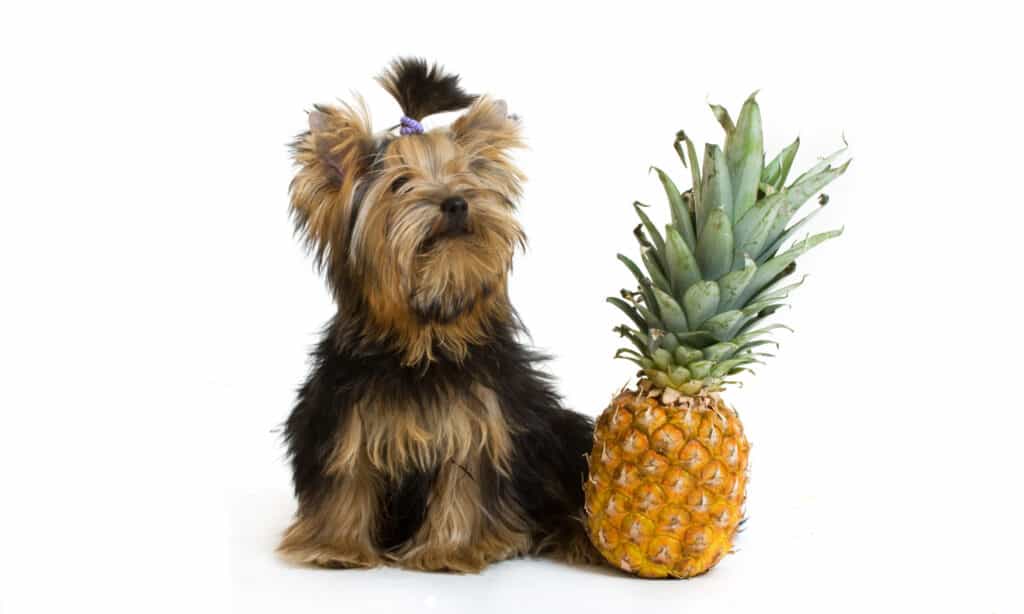The excitement of welcoming a new family member never fades. If you’re expecting puppies from your Yorkshire terrier, you’re probably eager to know all about the gestation period, weekly milestones, and care guide for the mother-to-be. These little canines may be little, but they need a lot of care during pregnancy.
Knowing what to anticipate throughout your Yorkie’s pregnancy is essential to protect her and her babies’ health and well-being. From tiny embryos to the final delivery stages, there are plenty of exciting milestones to track.
In this blog post, we’ll take you through the gestation period of a Yorkie, including weekly milestones and the essential care guide for your furry friend. So, let’s dive in and learn more about what to expect when your Yorkie is expecting.
Yorkshire Terrier Summary
The Yorkshire terrier is a breed of dog that steals hearts with its dainty, shiny coat. However, never mistake this little dog for a fragile weakling. Underneath its glossy exterior beats the heart of a true terrier, uniquely bred for the tough work of rat catching in the mines and mills of old England.
Today, these tiny pups are more likely to be curled up in a lap, but their tenacity and grit are still evident. At no more than seven pounds, Yorkies are a compact toy-size breed, but their personalities are larger than life.
Fearless and full of energy, these dogs make great companions for those who don’t mind a little sassiness now and then. With their floor-length, silky coats in steel blue and golden tan shades, Yorkshire terriers are truly one of a kind.

Yorkshire terriers were originally bred for the tough work of rat catching in the mines and mills of old England.
©Dulova Olga/Shutterstock.com
Yorkshire Terrier Pregnancy Symptoms
Yorkshire terrier pregnancy symptoms are crucial to recognize for owners who want to ensure the health and well-being of their beloved pets. By identifying these signs, pet owners can provide care and support for the expecting mother and her future puppies.
The average gestation period for a Yorkshire terrier is approximately 63 days, with variations ranging from a minimum of 58 days to a maximum of 68 days. If the pregnancy surpasses the typical duration, consulting a veterinarian to evaluate the situation is highly recommended.
Morning sickness is a common symptom that pregnant Yorkies may experience during the early stages of their pregnancy. This condition can manifest as nausea or general discomfort, and monitoring its progression is essential to ensure the mother’s optimal well-being.
Another possible indication of pregnancy in a Yorkshire terrier is an abnormal fluid discharge from the genital area, distinct from urine. A closer inspection may reveal dilation, supporting the likelihood of pregnancy.
Early Signs of a Pregnant Yorkie
Keep your eyes peeled for early signs of pregnancy in your Yorkie, as it’s not always obvious when she has mated. To confirm your suspicions, carefully watch for changes in her appearance or behavior.
Taking the scientific route is an option, but it has its drawbacks. A blood test from your vet can reveal if your Yorkie is expecting pups, but it won’t be accurate until the fourth week of pregnancy.
Your vet can also perform an X-ray or ultrasound, which provides concrete results. However, these tests are only viable later in your Yorkie’s pregnancy. Observe your Yorkie’s physical and behavioral changes to spot pregnancy signs. Some common indicators in Yorkies include:

The Yorkshire terrier is an affectionate breed that loves cuddles and companionship. They make great family pets.
©iStock.com/Irina Nedikova
1. A Change in Energy Levels
Yorkie pregnancies can be a game changer as energy levels take a nosedive. Typically lively, spirited, pregnant Yorkies suddenly morph into drowsy, passive creatures. Their once vibrant playfulness seems to vanish into thin air.
With sleep patterns going haywire, you’ll notice a pregnant Yorkie switching sleeping positions frequently. These changes in behavior are early signs that your Yorkie is expecting, so keep an eye out and prepare for the pitter-patter of tiny paws.
2. Visible Physical Changes
A Yorkie’s pregnancy journey starts with some telltale signs. The stomach takes center stage, becoming firmer, larger, and rounder. Next in line, her nipples experience a growth spurt, leaving you wide-eyed.
As time flies, the weeks reveal more changes. Nipples once camouflaged by fur now pop out, impossible to miss. Keep an eye on these early physical transformations; you’ll be prepared for your Yorkie’s upcoming bundle of joy. Every day, her body speaks volumes about the life growing inside.
3. Changing Grooming Practices
When your Yorkie’s expecting, her grooming habits shift gears. This early pregnancy sign stands out like a sore thumb, especially if you’re diligent with your pup’s grooming. As your pregnant Yorkie spruces up, she leaves no hair unturned. Cleaning herself from nose to tail, she ensures she’s in tip-top shape for her little ones. This sudden behavior change piques curiosity but offers valuable insights.
In short, increased grooming means it’s time to brace for tiny paws. Keep tabs on this telltale sign, and you’ll be all set to welcome the newest members of your canine clan.

Typically lively, spirited, pregnant Yorkies suddenly morph into drowsy, passive creatures.
©Seregraff/Shutterstock.com
4. Peculiar Nesting Behavior
A pregnant Yorkie soon reveals her secret through nesting behaviors. She busily collects soft items, seeking a serene spot for them. Be prepared to discover her crafting a fresh bed, separate from her usual resting place.
As the due date nears, the early signs become evident. The Yorkie’s motherly instincts kick into high gear, making way for the new arrivals. By observing her actions, you’ll stay in tune with her needs. Before long, the delightful sound of tiny paws will fill your home.
Late Signs of a Pregnant Yorkie
As time flies, you’ll spot late signs of your pregnant Yorkie. Around weeks three or four, her tummy grows noticeably larger — her appetite soars, eating for herself and her pups. Here are the late signs you should look out for:
1. Weight Gain
A pregnant Yorkie gains about 30% of her pre-pregnancy weight. With the proper diet, normal weight gain ranges from 1.2 to 2.1 pounds, based on her size and litter size. Keep tabs on her weight as the pregnancy advances. It’s time to connect with your vet if it skyrockets beyond normal. Figuring out the best course of action is essential for your Yorkie’s health and possibly survival.
Keeping her weight gain in check is vital, as obesity can throw a spanner in the works during pregnancy. Don’t let your Yorkie bite off more than she can chew in this delicate period. By monitoring her weight, you pave the way for a smoother experience for both mom and pups. Stay alert and collaborate with your vet to ensure a healthy pregnancy for your cherished Yorkie.
2. Ultrasound and a Blood Test

By around week six, veterinarians can use an ultrasound to spot the puppies, count their numbers, assess their positions, and detect abnormalities in a pregnant Yorkie.
©guys_who_shoot/Shutterstock.com
Blood tests are a reliable pregnancy indicator for Yorkies after the third week. As the weeks roll by, around week six or day 42, vets can use ultrasounds to spot the puppies, count their numbers, assess their positions, and detect abnormalities.
On day 45, an x-ray helps evaluate the puppies’ growth, while the ultrasound reveals their approximate age. This vital information is key in determining whether the puppies are safe and sound in their mother’s womb or if it’s time for them to face the world.
Natural birth or cesarean operations are both options for delivering the pups. However, it’s not all smooth sailing for Yorkies, as their small size increases the likelihood of requiring a cesarean operation.
Late signs of Yorkie pregnancy include blood tests after three weeks and ultrasounds by week six. These procedures ensure the mother’s and her puppies’ health and safety, paving the way for successful delivery – natural or cesarean.
Gestation Period of Yorkshire Terrier
Yorkie pregnancies are quite the adventure, with their gestation period typically ranging from 58 to 68 days. This duration is standard for most toy breeds and aligns with the third phase of a Yorkie’s heat cycle. As a pet parent, keeping track of your furry friend’s pregnancy timeline is essential since each day matters.
When a Yorkie reaches the 67th day of pregnancy and hasn’t given birth, it’s time to contact your vet. They might advise inducing labor or scheduling a cesarean operation based on ultrasound results. Don’t wait too long, as complications and potential risks increase for momma Yorkie and her pups.
Notably, toy breeds like Yorkshire terriers have higher maternal death rates, partly due to their petite size. Therefore, being proactive and monitoring your Yorkie’s pregnancy is crucial.
How Long Does Labor Last?
That varies depending on factors like the number of puppies she’s carrying. Generally, it lasts anywhere between 3 to 12 hours.

The Yorkshire terrier is a small but feisty companion breed that loves attention and playtime. They bring a lot of joy and love to their owners.
©iStock.com/Saksoni
Week 1: Business as Usual
You won’t see any physical or behavioral changes in the first week of your Yorkshire terrier’s pregnancy. Continue feeding and exercising her as usual without altering her routine.
Week 2: Monitor Weight Gain
During week 2, start tracking your dog’s weight. It shouldn’t gain over 10% of its normal body weight until week 6. Record its baseline weight and continue weighing it regularly. No changes in diet or energy levels are needed at this point.
Week 3: Appetite Changes
Although it’s still early, your Yorkshire terrier’s appetite may increase. Feed her more if needed, but ensure no excess weight gain.
Week 4: Vet Visit and Ultrasound
Schedule a vet visit for week 4 to confirm pregnancy through hormone tests, palpitation, or ultrasound. If any issues arise, work with your vet to address them.
Week 5: Increased Food Intake
As your dog gains weight during week 5, increase her food intake according to your vet’s recommendations.
Week 6: Nutritional Adjustments
In week 6, provide your Yorkshire terrier with a diet high in energy content, protein, and minerals. Follow your vet’s advice on addressing her changing nutritional needs. Split her meals into smaller portions throughout the day to manage her decreased appetite.
Week 7: Preparing for Birth
In week 7, ensure everyone knows what to do during birth and set up a whelping box for your dog. Consult with your vet about any appetite or nutritional concerns.
Week 8: Final Checkup
During week 8, your vet may recommend an X-ray to ensure everything within the dog’s belly is fine. You’ll notice your dog’s enlarged nipples and abdomen and may see or feel the puppies moving inside.
Week 9: Labor Approaching
In the final days of pregnancy, expect behavior changes such as restlessness, pacing, and nesting. Your dog may refuse to eat or have a clear vaginal discharge. Heavy panting and a drop in body temperature indicate labor is 8-24 hours away.
The delivery process usually takes one hour per puppy. Monitor your dog during this time, providing water and watching for complications. Consult with your vet about potential issues and how to handle them if necessary.
Preparing for Labor and Delivery
As your Yorkshire terrier’s due date approaches, prepare a whelping box during the final weeks of pregnancy. The goal is to create a secure, comfortable, and warm space for your dog to give birth and nurse her puppies. Use a child’s plastic swimming pool or purchase a pre-made whelping box.
Choose a quiet, draft-free location in your home to set up the whelping box and let your dog explore it. By doing this, you encourage her to use the box for delivery when the time comes. Consult the American Kennel Club’s checklist for essential materials to include with your whelping box.
Remember, preparation is key for a smooth labor and delivery process. With a well-prepared whelping box, your Yorkshire terrier will have a safe and comfortable space to welcome her new puppies.

Yorkshire terriers are known for their beautiful coats and friendly personalities.
©Zanna Pesnina/Shutterstock.com
Typical Yorkie Litter Size
Yorkie litter sizes tend to vary for each dog. Generally, they have around three puppies, with a typical range of 3 to 5. Larger litters (particularly those exceeding five puppies) pose a higher risk for stillbirth or early death, not to mention the increase in the mother’s mortality risk.
Ensuring proper and timely vet care is crucial throughout the entire process; this allows the mother to care for her newborns during their initial weeks. As the Yorkie puppies’ eyes open and they start walking, you can gradually wean them off her care.
Care for the Female Yorkie
Upon discovering your Yorkie’s pregnancy, take steps to ensure her well-being and happiness. Before mating, a thorough health examination of your Yorkie is ideal for preventing potential genetic issues. Doing so provides a safe breeding experience with another Yorkie or a different breed.
If mating occurs accidentally, schedule a comprehensive checkup immediately. Early detection helps address potential health concerns. When caring for your pregnant Yorkie, consider these tips:
- Handle your pet with exceptional gentleness.
- Gradually decrease her physical activity, especially intense exercise. Instead, take two daily 15-20 minute leisurely walks to maintain fitness.
- Create a cozy, soft, clean, comfortable resting area for her.
- Offer adequate food and water without overfeeding her. Consult your vet about meal scheduling, types, and quantities as her pregnancy progresses.
- Inquire about supplements with your vet. Only provide them if recommended by a professional.
Get Your Yorkshire Terrier the Best Pregnancy Care
Caring for a pregnant Yorkshire terrier involves a lot of patience, love, and attentiveness. Keep a close eye on her progress during gestation and watch for signs of labor. Don’t be alarmed if she gains weight or shows signs of anxiety – these are perfectly normal when expecting puppies.
Providing her with a calm environment and plenty of nutritious food will help her feel comfortable and relaxed. Lastly, consult your vet if any questions arise or if you become concerned about anything during this process. With the proper care and attention, your female Yorkshire terrier can have a safe and happy pregnancy, culminating in the joyous arrival of her pups.
The photo featured at the top of this post is © tsik/Shutterstock.com
Ready to discover the top 10 cutest dog breeds in the entire world?
How about the fastest dogs, the largest dogs and those that are -- quite frankly -- just the kindest dogs on the planet? Each day, AZ Animals sends out lists just like this to our thousands of email subscribers. And the best part? It's FREE. Join today by entering your email below.
Thank you for reading! Have some feedback for us? Contact the AZ Animals editorial team.






